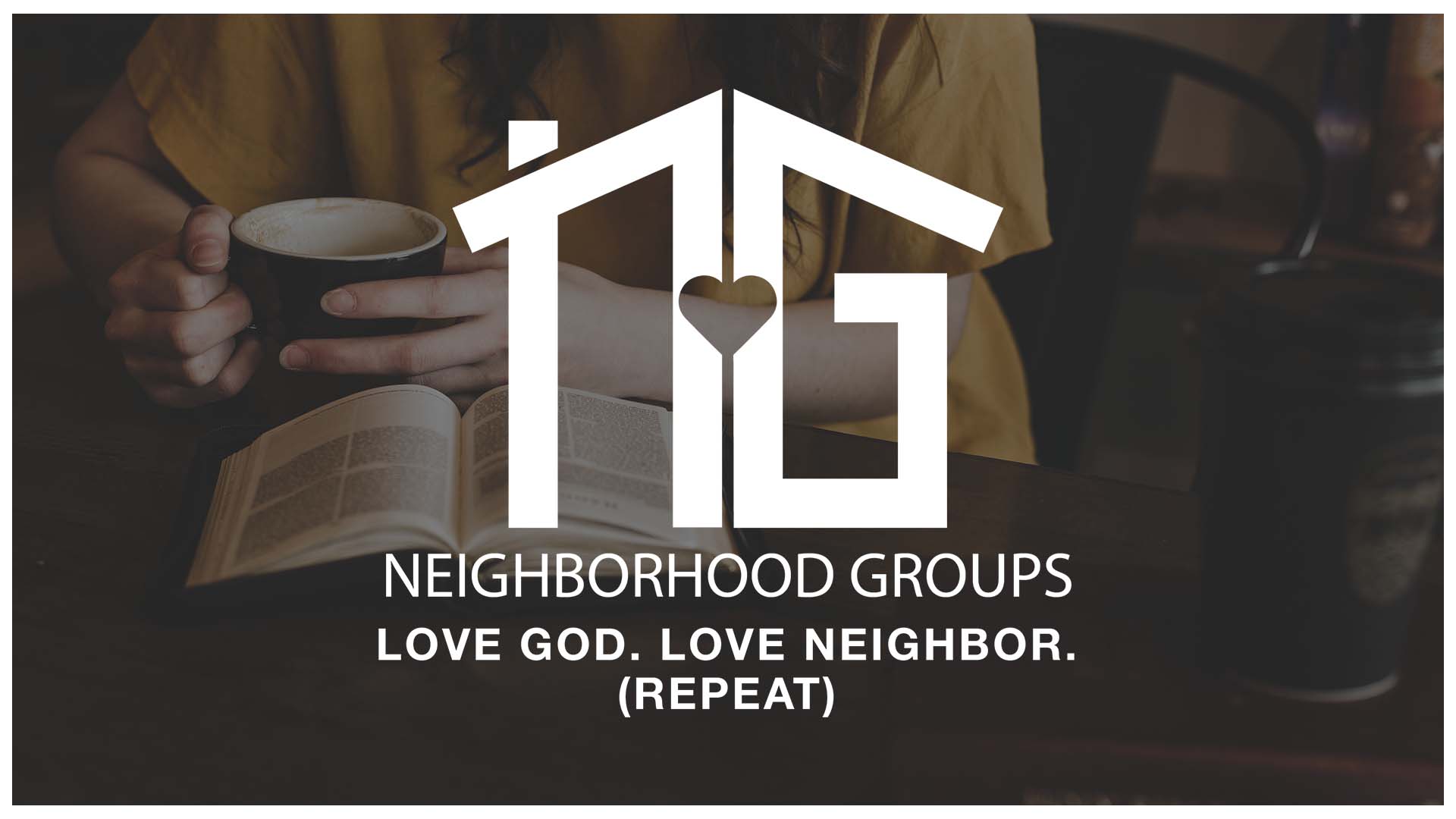No matter who you are, we were all created with a need for genuine community. Imagine the transformation that would take place if we all were part of a group where we could learn to love God supremely and love our neighbors where we live, work, study, play, and worship.
Neighborhood Groups
Gospel-centered Bible study, community, and fellowship
Love God
Love Neighbors
Find Community
Are you seeking to be a part of an authentic community where you can grow in your love for God and neighbors?
Neighborhood Group Vision
Watch Video here
Transforming Our Community with the Love of God
At Calvary Nexus, we are in the middle of a 10-year vision where we desire to saturate our community with Gospel-centered Neighborhood Groups. Through these groups, you can learn to make Jesus king in every realm of your life: personal, marriage, family, community, career, and calling.
Join a Neighborhood Group and be a part of what God is doing in our community!
Join a GroupWhy Neighborhood Groups?
Love God
Neighborhood Groups help people learn to take the greatest commandment seriously and love God supremely. We do this through reading the Bible and prayer.
Love Neighbors
We strive to learn to love our neighbors inside the group through prayer, meals together, recreation, and caring in times of need. We also strive to love our neighbors outside the group as we befriend, build relationships, pray for, serve, and invite them to the group.
Find Community
Having others to lean on and grow with is vital. These groups allow people to grow in relationship with one another to experience Gospel-centered community.
Take Your Next Step
1. Belong
Join a Neighborhood Group to grow in love for God and your neighbors.
2. Become
As you grow as a disciple, consider leading a Neighborhood Group in your community.
3. Befriend
Build relationships with others to share Christ’s love where you live, work, study, and play.
Lead a Group
Is God calling you to lead a Neighborhood Group in your community? Here’s how to get involved!
Frequently Asked Questions
Goals
What’s the difference between a Neighborhood Group and a Community group?
Scripture-based study guides are available:
Each week we provide a study-guide that includes commentary and discussion questions from the portion of Scripture that we studied on Sunday. It allows the group participants to dig deeper into the text and engage in active learning. It helps to align all of our groups, and thus the majority of our church, to a common focus and growth trajectory.
In our beta-groups, we have discovered that the study guides are very easy for leaders to use. This helps to give opportunities for additional people to help lead the group. Thus more people are developed to be future group leaders.
We refer to it as “Scripture-based” rather than sermon-based, because we have people who attend our groups who don’t yet come to a church and did not hear the Sunday sermon. They can still participate, because the study guide reinforces the sermon, but is not dependent upon the sermon.
Encourage and reinforce values of loving God and neighbors better:
The study-guide provides a weekly framework where group participants can share ways that they are seeking to love their neighbors inside and outside the group better. You can use this portion of the study guide with your group even if your group does not adopt a Scripture-based model following the Sunday sermon text.
Encourage margin to befriend and build relationships:
Most of us feel that we are too busy to develop relationships. Sometimes we are so busy supporting ministry and programs at the church campus that we have no time to get to know neighbors. NGs encourage us to create margin and intentionally invest time to get to know our neighbors – the people where we live, work, study, and play.
Building relationships with those who don’t yet know Christ will be one of the most effective ways to advance God’s kingdom. We want to love neighbors because it is a value that Christ commanded us to live. These relationships are not a program or a project, but simply a Christian value.
Geographic proximity and affinity:
Most of our groups are currently formed based on affinity. This includes common life-stage and/or common interests. We want to also encourage groups to form based on geographic proximity. Geographic proximity can encourage a greater connection with neighbors where you live.
More coach support:
We want to be more intentional to support you in your efforts to lead a healthy group where disciples are made that love God and neighbors better. By creating a church-wide vision more attention and resource can be available to support you.
Will neighborhood groups replace community groups?
All of our small groups are going to be referred to as neighborhood groups. We want our existing community groups to ideally adopt the neighborhood group culture idea. We want ideally for all of our groups to adopt the value of loving God and loving our neighbor, and creating margin in their life to befriend and build relationships.
Are we seeking to establish house churches?
No. Our Calvary Nexus community of faith will gather on weekends to worship, study the Bible, and experience God’s presence together. And we gather during the week in our NGs to learn to love God and neighbors better.
Isn’t this like the church in Acts?
Absolutely it is! The idea of loving your neighbor has been around forever.
Leadership
Is the study guide only provided to the leaders?
Study Guides will be available to leaders and everyone who attends a group.
What’s the difference between your assistant leaders and leaders who may oversee smaller portions of your group?
An assistant leader is being trained to lead a group. In addition to an assistant leader, helpers may oversee smaller portions of the group such as: prayer, refreshments, serving neighbors, or play activities.
Is your assistant leader inside your group?
Yes, definitely. Every leader will have at least one assistant leader from within their group.
What happens when a group discussion takes place and there’s a question about doctrine or theology or another issue that the group leader or the group collectively is unable to answer effectively?
The neighborhood study guide we provide for you will answer many questions. The leader is assigned a Neighborhood Group Coach. They can contact their coach to help with questions. Every coach has a pastor assigned to them and they can contact their assigned pastor for help when necessary.
Do you teach your group for 52 weeks of the year? Do you close down for holidays?
We strongly encourage the leaders to take breaks. Examples: Thanksgiving and Christmas and summer. Breaks give your host home a chance to recuperate, it gives you and your assistant leader a chance to recuperate. During the summer months be creative and get together for social events, stay in contact with each other. It’s okay to take breaks.
Content
Does our group have to adopt the Scripture-based study from the Sunday sermon?
No. We would ask you to utilize the weekly study-guide portions related to encouraging the values of loving neighbors within and beyond the group better.
Is it okay to do other things besides the study guide to foster relationships?
Absolutely. The leaders of the group are encouraged to be creative and to be led by the Spirit.
Growth
Do we have to start inviting my neighbors to our group?
No. We do hope that as your group intentionally builds relationships with neighbors where you live, work, study, and play that over time you’ll discover the blessings of inviting these neighbors to your group.
What if one of the neighbors we come in contact with is from another church?
People from other churches are welcome at our groups. However, we never want to recruit them to come to Calvary Nexus.
How large should a neighborhood group be?
Anywhere from about 8-16 regular attendees. It is ideal for groups to replicate themselves after the group has 16 members coming consistently.
What are some of the benefits of having multi-generational people in your neighborhood groups?
Just as younger generations bring with them passion and zeal, the older generations come with wisdom and stability. All generations will benefit from coming together in many ways.
When a group has reached capacity, how do you birth a new group?
Begin your group with a mutual understanding that you will be birthing a new group once the current group reaches capacity. When a group gets to a size where it is difficult for everyone to participate it becomes necessary for someone to start another. Remember part of this vision is to saturate our city, which necessitates starting more groups.
Sharing your faith
Do we have to share our faith with our neighbors?
No. We hope that as you befriend that you can share life. Listen to your neighbors, play together, serve them, have a meal, pray for or with them, and over time God will open doors to share your faith.
How do you approach neighbors from a different faith?
Take it slow, build a relationship, find common ground and bring the gospel in from that point. The Apostle Paul did this in Acts 17. He found common ground with the philosophers of the day, but then through the conversation he distinguished the God of the Bible and the gods that they had worshipped. Be respectful. It’s too easy to come across like we know it all. Be patient, but also be clear. There are distinguishing factors between Christianity and other religions.
Neighborhood Group Resources
Are you a leader who wants to go deeper? Visit our resources page for free downloads, videos, and guides to help you better lead your group.

